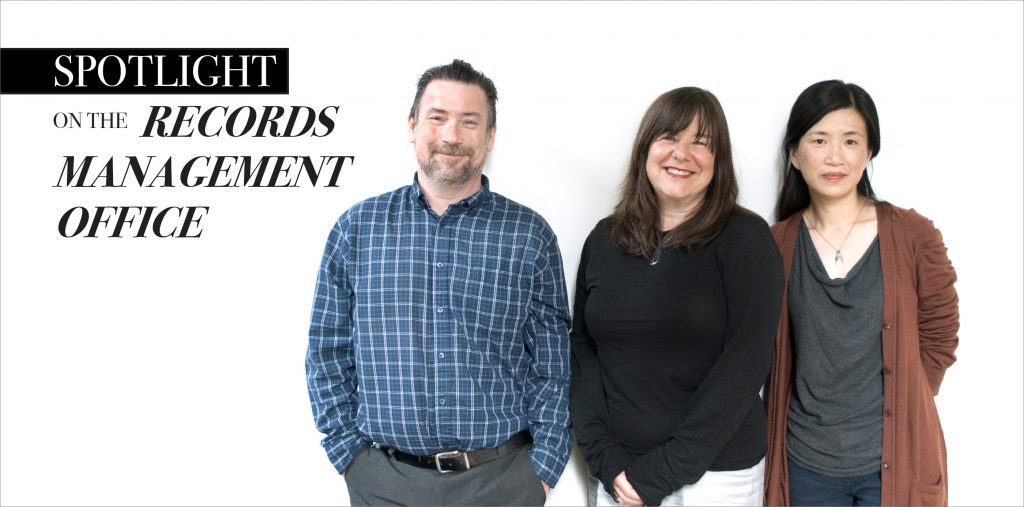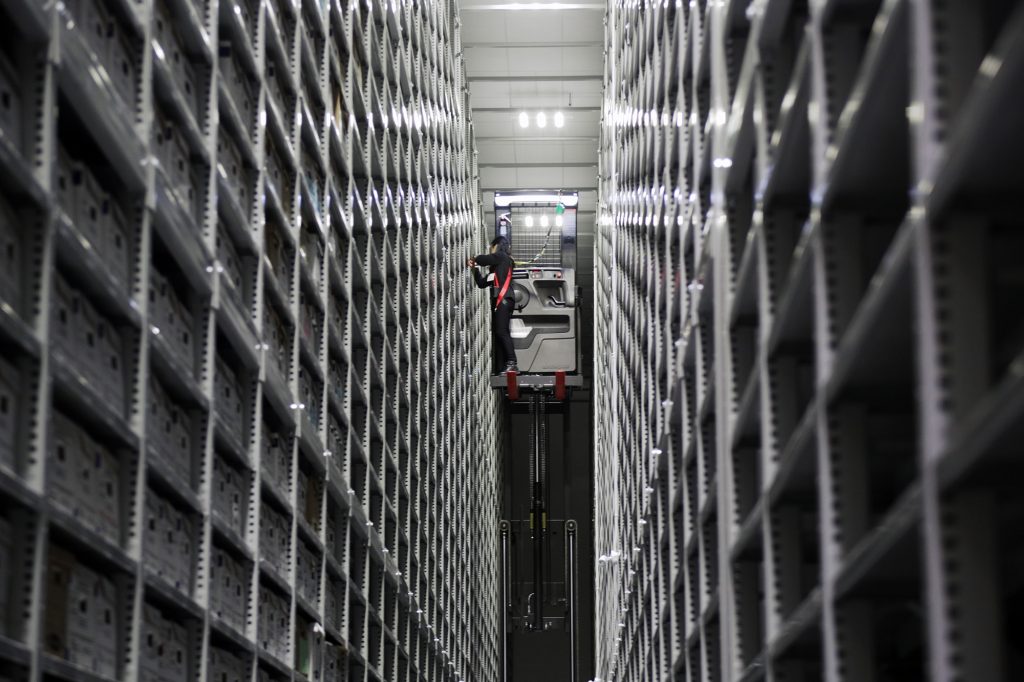
The Records Management Office at the University of British Columbia provides a unified approach to records management and leads the transition to electronic records management in a secure and sustainable manner.
Learn about how their efforts are at the forefront of helping UBC manage risk, reduce costs, and improve efficiency.
What are your roles in helping UBC manage its records?
Alan Doyle: I lead the Records Management (RM) program as we try to change the culture of record keeping at UBC.
Erin Chiu: My role deals with the operations side of the “business,” i.e.: processing incoming boxes of records, picking up and delivering the boxes, and confidential shredding of records when they reach the end of their agreed retention periods.
Barbara Towell: I was hired in March 2015 in a newly created position to focus on electronic records. In this capacity, I am producing guidelines for digital readiness, records classification and retention schedules, assisting with training staff, and working on projects.
How have you seen the importance of records management increase on campus?
EC: Due to continuously shrinking office space, it is wise to make the best use of space available by knowing what records to keep for long term and which records to dispose of.
BT: The lack of clarity around records retention poses an increased risk to the University. Technology and continuously evolving business models mean that there is no longer a single person responsible for filing and storage records. In many units, recordkeeping responsibilities are unclear and complicated at best. In the brave new world of e-records, different questions have to be asked.
AD: We live in a hybrid world – everyone manages both paper and electronic materials. It is both the volume and format of records people struggle with. We have seen a surge of interest in email management, naming conventions for shared drives, etc.

Records Management and Storage Assistant, Erin Chiu, shelves boxes of records in the Library Preservation and Archives (PARC) facility.
What is the biggest myth that staff have about managing records?
AD: There are two myths that I see every day: 1) That people need to keep information forever and that is the only “true” way to be good record keepers. In fact, destroying records according to RM rules is the best and safest way to be in compliance. 2) That the unit doesn’t have anything “important” to preserve. That is not true as all units have archival value.
EC: That it’s a waste of time.
BT: The first myth is that managing records is a difficult and an overwhelming task. We apply a risk-based approach to records management projects and prioritize key record series first. It can seem daunting but the rewards of this approach far outweigh the challenges. The second myth, and without a doubt the biggest, is that technology alone can replace commitment, documentation, and communication. Technology is only a tool – we must define and describe how the tool will be used.
What are you most surprised by when you assess a department’s records?
BT: How passionate folks are when they talk about their work that is represented in the records, and how exciting a seemingly dull subject like RM can be.
AD: After 14 years I am rarely surprised! Silverfish startle me sometimes, though!
What advice would you give to departments who are interested in using your services?
BT: Prepare for a passionate and spirited conversation about their work and if they are serious about having effective RM in their office, prepare to document and communicate.
EC: Think about the ease of access, in terms of how you physically organize the records, and what brief descriptions you give to summarize the records in a box.
“Talk to us. We are a service-based unit and we try to make RM as easy to understand and painless as possible. We can help you with almost any RM problem, and if we can’t, we’ll find someone who can!” – Alan Doyle, University Records Manager
What do you find most rewarding about working in the Records Management Office?
EC: I have been part of the RMO for only a short time, the most rewarding part so far is learning about records management and records storage.
AD: I enjoy finding solutions and creating order out of chaos. If a unit is able to use our help to gain control over their records, that is a win. If the unit tells other units – even better! RMO staff are excellent people and very committed to finding solutions. Working as a unit to help people is very rewarding.
BT: I enjoy helping units take ownership over their processes and records. Having being trained at the School of Library and Archival Studies (iSchool) as an Archivist, I know that my work will directly influence the acquisition of electronic archival records to the University archives, and that feels like rewarding and important work. Sometimes, RM issues can become a learning opportunity for iSchool students and it has benefited our department to have iSchool so close by and so willing to participate. It gives me personal pleasure to work directly with students and give something back to my alma mater.
